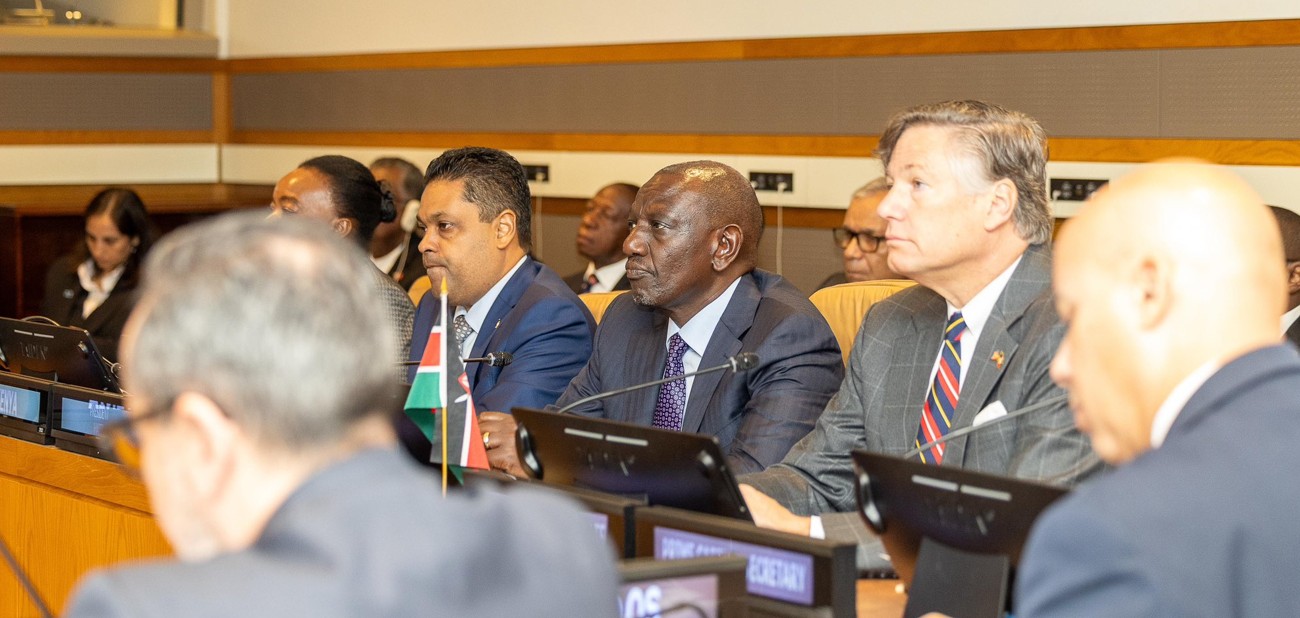Ruto urges global financial reform to unlock Sh38.79 trillion for Africa’s climate, development goals

Ruto urged the international community to release previously pledged funds and reform the global financial architecture to ensure equitable access to resources for developing countries.
President William Ruto has criticised global financial institutions for failing to provide affordable funding to support Africa’s climate and development ambitions, saying the current system favours wealthy nations while trapping vulnerable economies in cycles of debt, high borrowing costs, and limited access to emergency support.
Speaking at the 80th session of the United Nations General Assembly in New York, Ruto urged the international community to release previously pledged funds and reform the global financial architecture to ensure equitable access to resources for developing countries.
More To Read
- How Trump–Ruto health deal fills the void left after USAID exit
- UNAIDS hails Kenya–US health framework as major boost for HIV response
- Kenya, US sign Sh208 billion health cooperation deal to transform to strengthen primary care, services
- Ruto backs IMF partnership as key to Kenya’s debt, economic reforms
- Tough decisions stabilised the economy, saved Kenya from shame – Ruto
- Ruto and Oburu strengthen UDA-ODM alliance after by-election win
“I have argued, and I say it again, that the current global financial architecture punishes poor countries while rewarding the rich. Its rules, priorities and allocation mechanisms consistently favour those already prosperous, while trapping vulnerable economies in cycles of debt, high borrowing costs and inadequate access to emergency support,” Ruto said.
He noted that implementing new Nationally Determined Contributions (NDCs) will require $56 billion (Sh7.24 trillion), and called on the global community to unlock the $300 billion (Sh38.79 trillion) agreed at Baku and accelerate negotiations toward the new $1.3 trillion (Sh168.09 trillion) target under the Baku-Belém Roadmap.
“Without affordable finance and without reform of the international financial architecture, the promise of climate action in Africa will remain constrained,” he added.
Bretton Woods institutions
Ruto traced the origins of the current system to the Bretton Woods institutions, created after World War II to stabilise the global economy and rebuild war-torn Europe. While the International Monetary Fund (IMF) and World Bank have since evolved into development finance institutions, he said their governance remains dominated by wealthy countries.
“Today, the global context is vastly different. The gold standard collapsed five decades ago, and Europe has long since been rebuilt. Yet the governance of these institutions has not kept pace with the needs of a multipolar world, especially the needs of poor and developing countries,” he said.
He highlighted that in the IMF’s recent allocation of Special Drawing Rights, 64 per cent went to wealthy countries with little need for liquidity support, while the poorest countries received just 2.4 per cent, highlighting the inequity in global financial systems.
Ruto called for transforming these institutions into independent, apolitical bodies that serve all countries fairly.
“Such a shift would democratise decision-making, restore credibility, and allow the IMF and the World Bank to serve all countries fairly, rather than reinforcing old hierarchies,” he said.
While advocating for reform, Ruto said Africa is taking steps to strengthen financial independence. He emphasised that Kenya has endorsed the establishment of the Alliance of African Multilateral Financial Institutions, launched with the African Union in February 2024.
The alliance brings together African banks and financial institutions such as Afreximbank, the Africa Finance Corporation, the Trade and Development Bank, Shelter Afrique, Africa Re, African Trade and Investment Development Insurance, and ZEP-RE.
The African Union is also advancing three key institutions: the African Central Bank, to issue a single currency; the African Monetary Fund, to stabilise economies; and the African Investment Bank, to mobilise resources for infrastructure, industrialisation, and integration.
Additionally, the African Credit Rating Agency has been established to provide fair assessments that reflect Africa’s realities.
On climate action, Ruto emphasised that Africa is not a passive victim but a source of solutions.
“Climate change is not only the single greatest threat of our age, but also one of the greatest transformation opportunities of our time,” he said.
He highlighted that 93 per cent of Kenya’s electricity comes from renewable sources and detailed ongoing investments in e-mobility, climate-smart agriculture, clean cooking solutions, green manufacturing, sustainable waste management, and circular economy initiatives.
Ruto also highlighted Africa’s collective efforts through the Africa Climate Summits, including the adoption of the Nairobi Declaration on Climate Action and the recent reaffirmation of commitments at the second Africa Climate Summit in Addis Ababa.
“We declared Africa not just as a victim of the crisis, but as a source of solutions, with climate action driving economic growth, transformation and job creation for our communities,” he said.
Top Stories Today














































